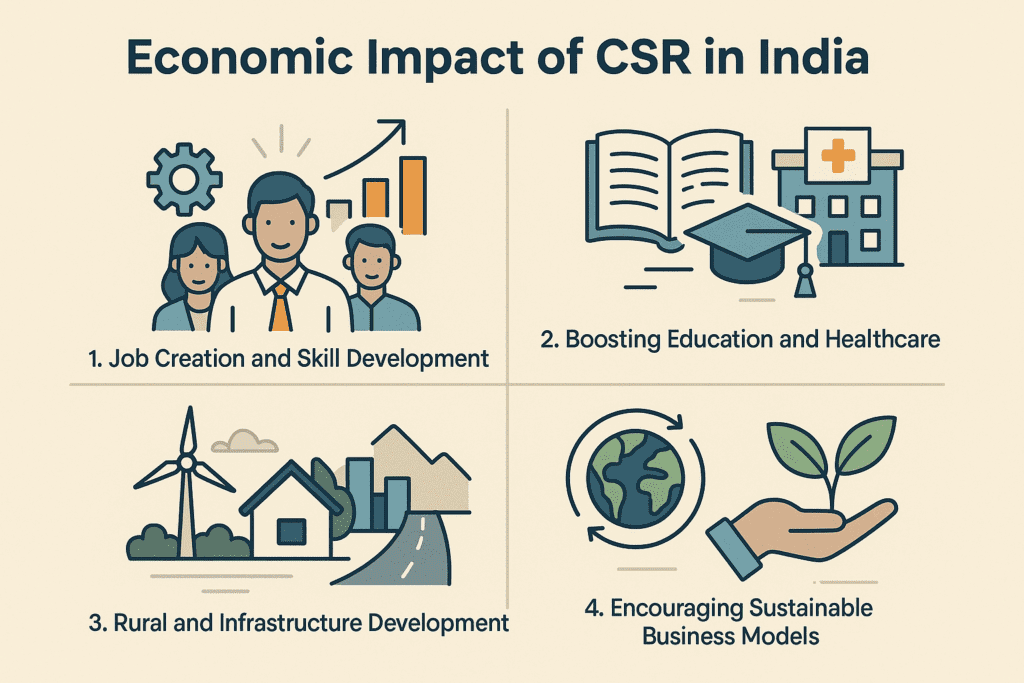Corporate Social Responsibility (CSR) has emerged as a transformative force in India’s business landscape. Since the implementation of the CSR Act 2013, companies have been encouraged to contribute a portion of their profits towards social, environmental, and community development initiatives. This not only strengthens social welfare but also shapes the impact of CSR in India on long-term sustainable development.
In recent years, CSR has moved beyond being a philanthropic gesture to becoming a strategic investment in the nation’s economic and social progress. By aligning business goals with community needs, organizations are creating measurable outcomes that drive inclusive growth. Let’s explore the economic impact of CSR in India and how it contributes to building a sustainable future.
The Growing Importance of CSR in India
The impact of CSR in India is deeply rooted in legislation and growing corporate awareness. Under the Companies Act, 2013, eligible companies are required to spend at least 2% of their average net profits on CSR initiatives. This regulation has opened new opportunities for addressing social inequalities, rural development, healthcare, education, skill enhancement, and environmental protection.
More importantly, CSR activities are not just charity; they are investments in human capital and community infrastructure. When businesses actively participate in social development programs, they create ripple effects that benefit the economy at large.
Economic Impact of CSR in India
The economic impact of CSR is evident across multiple sectors. By channeling billions of rupees annually into development projects, businesses are complementing government efforts to improve public welfare. Here are some areas where CSR has significantly influenced economic outcomes:

1. Job Creation and Skill Development
CSR projects that focus on vocational training, entrepreneurship programs, and employability initiatives have empowered youth, especially in rural and semi-urban regions. By equipping individuals with relevant skills, companies are indirectly fueling job creation and reducing unemployment.
2. Boosting Education and Healthcare
Investments in primary education, digital literacy, and healthcare facilities not only improve quality of life but also strengthen human capital. A healthier, educated workforce contributes more productively to the economy, creating a positive cycle of growth.
3. Rural and Infrastructure Development
The impact of CSR in India is visible in rural development projects such as clean drinking water, sanitation facilities, and renewable energy adoption. These initiatives enhance the standard of living, improve productivity, and attract further investments into underdeveloped regions.
4. Encouraging Sustainable Business Models
CSR has inspired companies to adopt green practices, renewable energy solutions, and sustainable supply chains. This reduces operational risks, builds resilience, and ensures long-term economic stability.
Impact of CSR on Sustainable Development
CSR is a catalyst for achieving the United Nations Sustainable Development Goals (SDGs) in India. The impact of CSR on sustainable development can be observed in the following ways:
- Environmental Protection: Initiatives such as afforestation, waste management, and carbon reduction projects are helping mitigate climate change.
- Social Inclusion: By focusing on marginalized communities, CSR ensures equitable access to resources and opportunities.
- Economic Empowerment: Through microfinance programs, women empowerment projects, and self-help groups, CSR activities enhance financial independence and resilience.
The integration of CSR with sustainable practices has created a pathway where businesses can thrive while contributing positively to society and the environment.
Challenges in Measuring the Impact of CSR in India
While the economic impact of CSR is undeniable, measuring its long-term effectiveness remains challenging. Many organizations struggle with:
- Lack of standardized measurement tools to assess real impact.
- Fragmented projects that lack scalability and long-term vision.
- Compliance-driven approach rather than strategic alignment with business goals.
To overcome these challenges, companies need to focus on impact assessment frameworks, data-driven strategies, and partnerships with NGOs and government bodies.
Future Outlook: CSR as a Driver of Sustainable Growth
The impact of CSR in India is set to expand as businesses increasingly recognize their role in shaping sustainable economies. Emerging trends show a shift towards:
- Technology-driven CSR projects like digital literacy, AI-driven healthcare, and online education platforms.
- Climate-conscious CSR initiatives focusing on renewable energy, sustainable agriculture, and biodiversity conservation.
- Collaborative CSR models where companies partner with government agencies, NGOs, and international organizations for large-scale impact.
As companies align their CSR strategies with the economic impact of CSR and impact of CSR on sustainable development, India is moving closer to achieving inclusive and sustainable growth.
Conclusion
The impact of CSR in India goes far beyond mandatory compliance. It plays a critical role in shaping the nation’s socio-economic fabric while addressing environmental challenges. By investing in education, healthcare, rural development, and sustainability, CSR has a profound economic impact that aligns with the broader vision of sustainable development.
For India to achieve long-term growth, businesses must continue to view CSR not just as an obligation but as a strategic opportunity to foster resilience, empower communities, and build a sustainable future.



